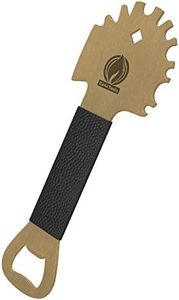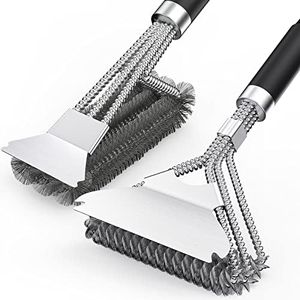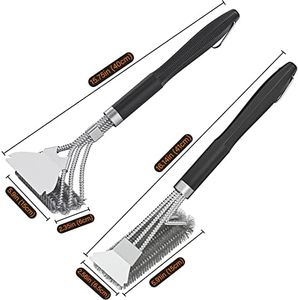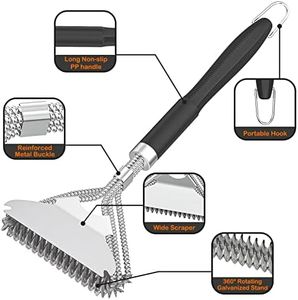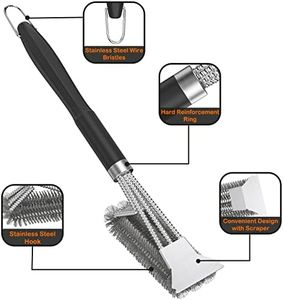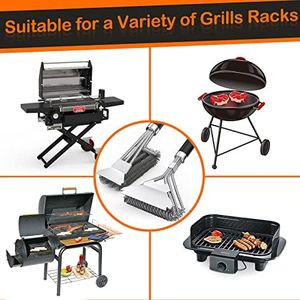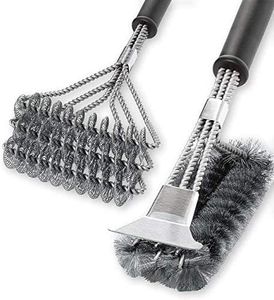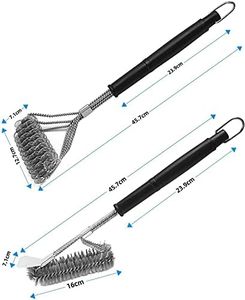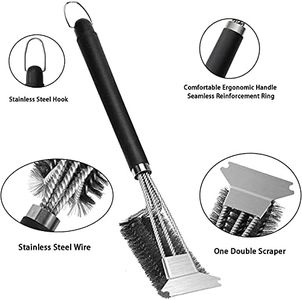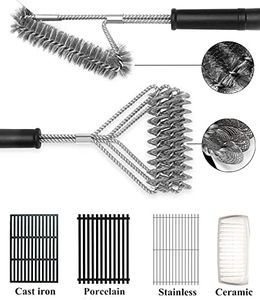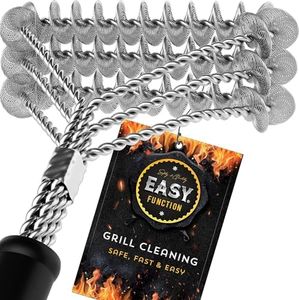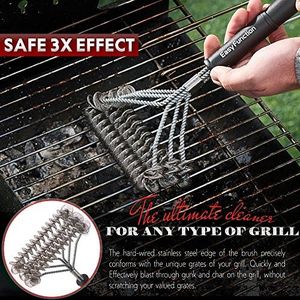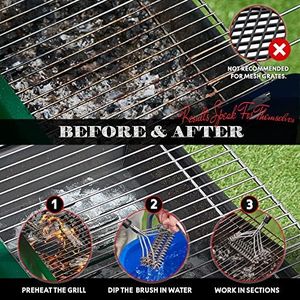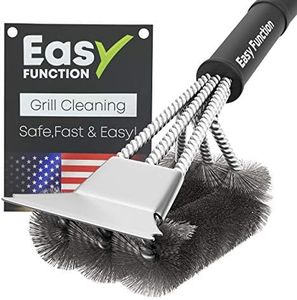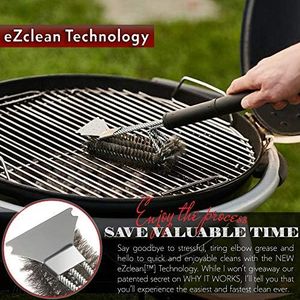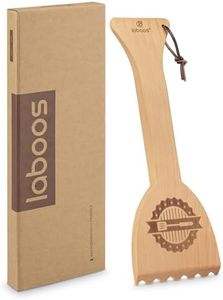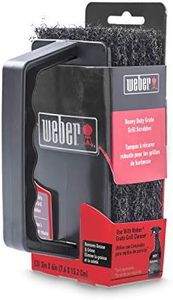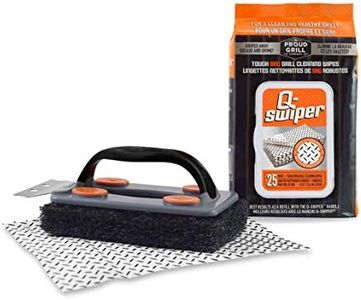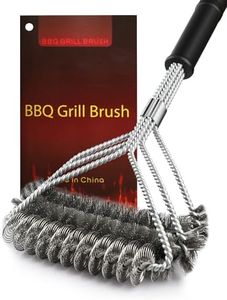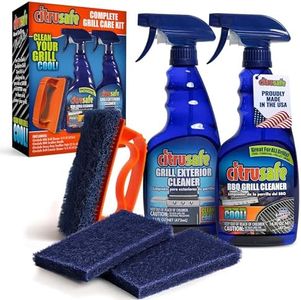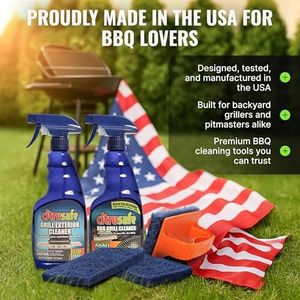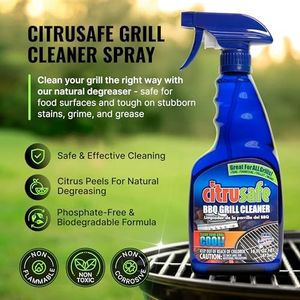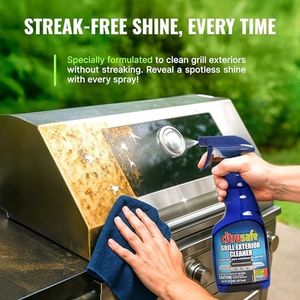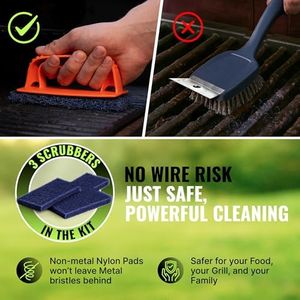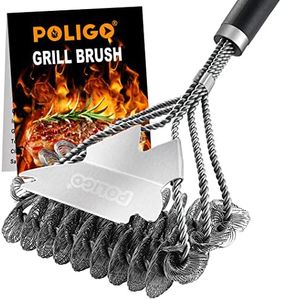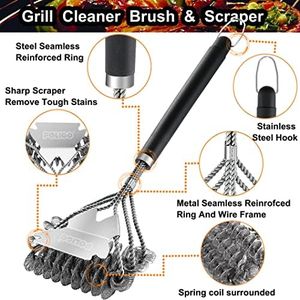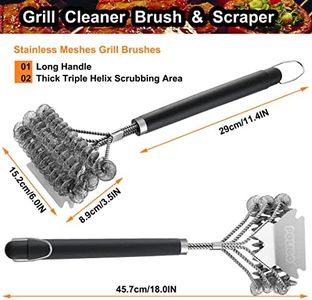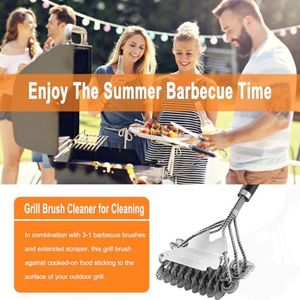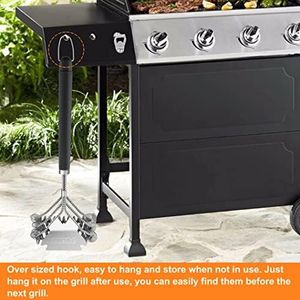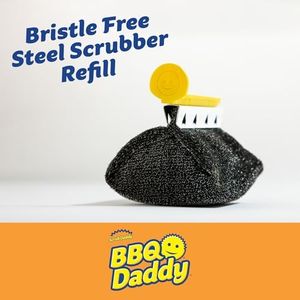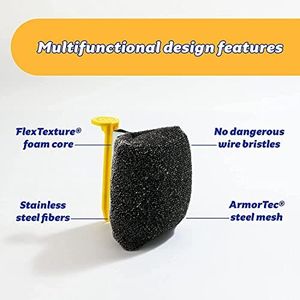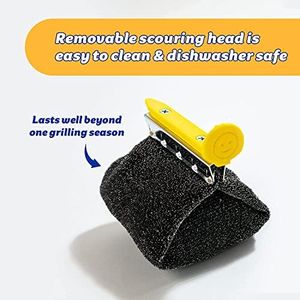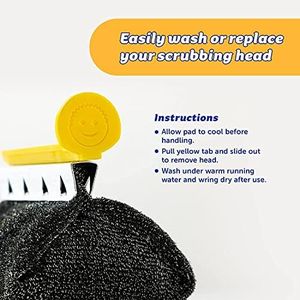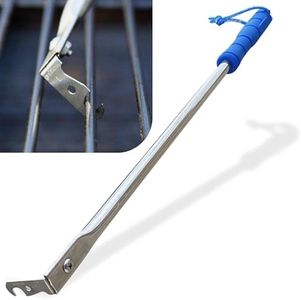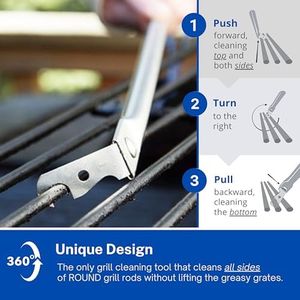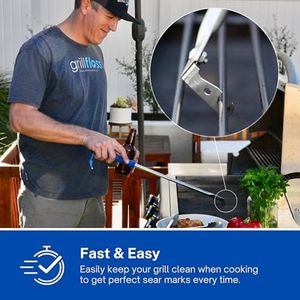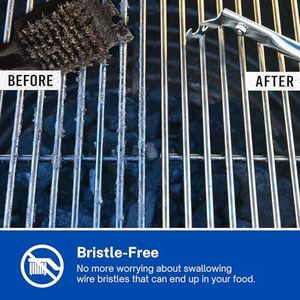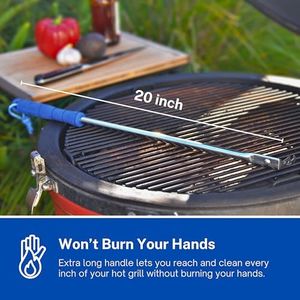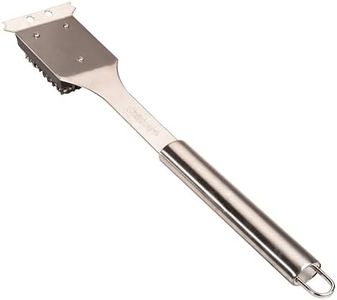We Use CookiesWe use cookies to enhance the security, performance,
functionality and for analytical and promotional activities. By continuing to browse this site you
are agreeing to our privacy policy
10 Best Grill Cleaners
From leading brands and best sellers available on the web.By clicking on a link to a third party's website, log data is shared with that third party.
Top 10 Best Grill Cleaners 2026 in Canada
Sponsored
#1
Winner
2 Packs BBQ Grill Brush, BBQ Brush Cleaner for Grill, BBQ Accessories Cleaning Brush, BBQ Brush Bristle Free Suitable for Gas, Charcoal, Infrared & Barbecue Grill
2 Packs BBQ Grill Brush, BBQ Brush Cleaner for Grill, BBQ Accessories Cleaning Brush, BBQ Brush Bristle Free Suitable for Gas, Charcoal, Infrared & Barbecue Grill
Type of Cleaner: Mechanical brush
Chemical Composition: None
Compatibility with Grill Material: Gas, charcoal, infrared, porcelain, smoker
Ease of Use: 15-inch non-slip handle, good control
Scent: None
Residue and Rinsing Requirements: No chemical residue
Chosen by 1459 this week
Sponsored
Scrub Daddy Grill Brush BBQ Daddy - Steam Clean with Steel Scrubber and Stainless Steel Scraper, Bottle Opener and Replacable Heads- No Bristles- Contains 1 Brush and 1 Scour Daddy Steel Head, 1ct
Scrub Daddy Grill Brush BBQ Daddy - Steam Clean with Steel Scrubber and Stainless Steel Scraper, Bottle Opener and Replacable Heads- No Bristles- Contains 1 Brush and 1 Scour Daddy Steel Head, 1ct
Type of Cleaner: Physical tool with foam and steel fibers
Chemical Composition: None, chemical-free
Compatibility with Grill Material: Safe for all grill materials
Ease of Use: Manual scrubbing, no spray-and-wipe
Scent: None
Residue and Rinsing Requirements: No residue or rinsing needed
2 Pack BBQ Grill Brush, 18 inch BBQ Accessories, BBQ Cleaning Brush Safe Bristle Free BBQ Brush,100% Rust-Proof Stainless Steel- BBQ Grill Cleaner for Gas, Charcoal, Smoker, Porcelain, Infrared Grill
2 Pack BBQ Grill Brush, 18 inch BBQ Accessories, BBQ Cleaning Brush Safe Bristle Free BBQ Brush,100% Rust-Proof Stainless Steel- BBQ Grill Cleaner for Gas, Charcoal, Smoker, Porcelain, Infrared Grill
Type of Cleaner: Bristle-free brush, scraper, 360° rotating head
Chemical Composition: No chemicals used
Compatibility with Grill Material: Porcelain, Ceramic, Gas, Charcoal, Infrared
Ease of Use: 18-inch handle, non-slip grip, storage hook
Scent: No scent
Residue and Rinsing Requirements: No residue, rinse with water only
Grill Brush & BBQ Cleaning Scraper - 100% Safe Bristle Free Grill Cleaner - Best Barbecue Brush for Porcelain Propane Electric Infrared Stainless Steel Gas Iron & Weber Grill Grates
Grill Brush & BBQ Cleaning Scraper - 100% Safe Bristle Free Grill Cleaner - Best Barbecue Brush for Porcelain Propane Electric Infrared Stainless Steel Gas Iron & Weber Grill Grates
Type of Cleaner: Mechanical
Compatibility with Grill Material: Gas, ceramic, propane, infrared, stainless steel
Ease of Use: Easy to handle with plastic grip
Scent: Scent-free
Residue and Rinsing Requirements: No residues or rinsing required
Easy Function Grill Brush and Scraper - Safe 3 in 1 BBQ Brush & Grill Cleaner for Cleaning Any Barbecue Grill
Easy Function Grill Brush and Scraper - Safe 3 in 1 BBQ Brush & Grill Cleaner for Cleaning Any Barbecue Grill
Type of Cleaner: manual grill cleaner
Chemical Composition: none
Compatibility with Grill Material: stainless steel, cast iron
Scent: none
Residue and Rinsing Requirements: no residue, easy rinsing
Bryson Industries Grill Cleaning Kit - BBQ Grid and Grill Grate Cleanser, Exterior Cleaner, and Scrubber by Citrusafe (16 oz Each)
Bryson Industries Grill Cleaning Kit - BBQ Grid and Grill Grate Cleanser, Exterior Cleaner, and Scrubber by Citrusafe (16 oz Each)
Type of Cleaner: Citrus-based degreaser
Chemical Composition: Natural citrus, non-toxic, biodegradable, phosphate-free
Compatibility with Grill Material: Gas, charcoal, smokers, ovens, microwaves
Ease of Use: Spray, wait 1 min, scrub, wipe, cool grill
Scent: Mild citrusy (natural d-limonene)
Residue and Rinsing Requirements: Minimal rinsing; wipe to remove residue
POLIGO BBQ Grill Cleaning Brush Bristle Free & Scraper - Triple Helix Design Barbecue Cleaner - Non-Bristle Grill Brush and Scraper Safe for Gas Charcoal Porcelain Grills - Ideal Grill Tools Gift
POLIGO BBQ Grill Cleaning Brush Bristle Free & Scraper - Triple Helix Design Barbecue Cleaner - Non-Bristle Grill Brush and Scraper Safe for Gas Charcoal Porcelain Grills - Ideal Grill Tools Gift
Type of Cleaner: Mechanical brush, stainless steel coil
Chemical Composition: No chemicals involved
Compatibility with Grill Material: Porcelain, Ceramic
Ease of Use: 18-inch handle for leverage
Scent: Neutral
Residue and Rinsing Requirements: Minimal residue beyond loosened food
Scrub Daddy Replacement Grill Brush Head BBQ Daddy - Steam Clean with Steel Scrubber and Stainless Steel Scraper- No Bristles- Contains Scour Daddy Steel Replacement Head, 1ct, Black
Scrub Daddy Replacement Grill Brush Head BBQ Daddy - Steam Clean with Steel Scrubber and Stainless Steel Scraper- No Bristles- Contains Scour Daddy Steel Replacement Head, 1ct, Black
Type of Cleaner: Water-activated steam cleaning
Chemical Composition: No harsh chemicals
Compatibility with Grill Material: Compatible with most grill materials
Ease of Use: Replaceable brush head, lightweight, easy
Scent: No added scent
GrillFloss Grill Brush Bristle Free - Alternative Grill Cleaner Tool for Round Grill Grates - Ultimate Grill Scraper for Outdoor Grill - Cleans Top and Bottom of Grill Rods Without Lifting Grates
GrillFloss Grill Brush Bristle Free - Alternative Grill Cleaner Tool for Round Grill Grates - Ultimate Grill Scraper for Outdoor Grill - Cleans Top and Bottom of Grill Rods Without Lifting Grates
Type of Cleaner: manual scraper tool
Chemical Composition: none
Compatibility with Grill Material: round grill rods
Ease of Use: convenient, time-saving, cleans warm grill
Scent: none
Residue and Rinsing Requirements: no residue, clean by scrubbing blade
#10
Buying Guide for the Best Grill Cleaners
Choosing the right grill cleaner can make maintaining your grill much easier and help extend its lifespan. The best grill cleaner for you depends on the type of grill you have, how often you use it, and your cleaning preferences. Understanding the key features and specifications of grill cleaners will help you select a product that is effective, safe, and convenient for your needs.Type of CleanerThe type of grill cleaner refers to whether it is a spray, foam, gel, or wipe. This is important because different types are suited for different cleaning tasks and preferences. Sprays and foams are good for covering large areas and breaking down grease, while gels can cling to vertical surfaces for deeper cleaning. Wipes are convenient for quick touch-ups. If you clean your grill after every use, wipes or sprays might be enough. For deep cleaning sessions, a gel or foam that can sit on the surface and break down tough residue may be better.
Chemical CompositionThis spec tells you whether the cleaner is made from natural ingredients or contains strong chemicals. It's important because some chemicals can be harsh on your grill or leave residues that might affect food safety. Natural or biodegradable cleaners are safer for the environment and for grills used for cooking food, but they may require more effort. Strong chemical cleaners work faster and are more effective on heavy buildup, but you need to rinse thoroughly. If you have sensitivities or want to avoid harsh chemicals, look for plant-based or non-toxic options.
Compatibility with Grill MaterialNot all cleaners are safe for every grill material. Some are designed for stainless steel, while others are safe for porcelain, cast iron, or chrome. Using the wrong cleaner can damage your grill's surface. Always check if the cleaner is compatible with your grill's material. If you have a stainless steel grill, pick a cleaner labeled safe for stainless steel. For porcelain or cast iron, make sure the cleaner won’t strip protective coatings or cause rust.
Ease of UseEase of use refers to how simple and convenient the cleaner is to apply and remove. Some cleaners require scrubbing, while others just need to be sprayed and wiped off. This matters if you want a quick cleaning process or if you’re willing to spend more time for a deeper clean. If you prefer minimal effort, look for cleaners that advertise 'no scrubbing' or 'rinse-free' formulas. If you don’t mind a bit of elbow grease for a thorough job, a cleaner that requires scrubbing might be more effective.
ScentThe scent of a grill cleaner can affect your cleaning experience, especially if you are sensitive to strong smells. Some cleaners have a strong chemical odor, while others are unscented or have a mild, pleasant fragrance. If you are sensitive to smells or plan to use the grill soon after cleaning, choose a low-odor or unscented cleaner. If you like a fresh scent, look for products that mention a specific fragrance.
Residue and Rinsing RequirementsSome grill cleaners leave behind a residue that needs to be rinsed off, while others are designed to evaporate or wipe away cleanly. This is important because leftover residue can affect the taste of your food or even be unsafe. If you want a hassle-free experience, look for cleaners that are labeled as 'no-rinse' or 'food-safe.' If you don’t mind rinsing, you can use stronger cleaners but make sure to follow the instructions carefully.
